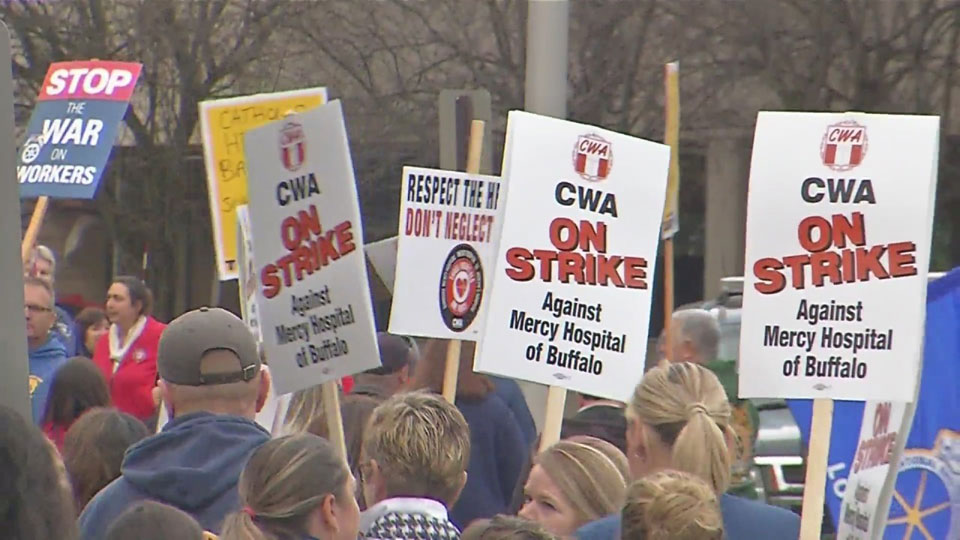
BUFFALO—A landmark mandate for safe-staffing ratios–benefiting both patients and nurses–is the highlight of new contracts covering 2,500 staffers, mostly nurses, at three Buffalo hospitals. Communications Workers Locals 1133 and 1168 represent the workers.
While the pacts do not contain any actual ratios, they’re modeled on a California safe-staffing law, proposed federal legislation, and a New York state law scheduled to start Jan. 1, said Debora Hayes, CWA’s area director.
They also represent a breakthrough in the campaign by CWA and other unions representing nurses, especially National Nurses United, to mandate such safe staffing, overcoming the greed of both hospital chains and insurers.
The insurers ruthlessly demand cuts in inpatient care—including short-staffing and early evictions of convalescing patients—in their quest for higher profits for shareholders and bigger bonuses for corporate honchos.
And hospital bosses, when not chasing their own profits, often use the insurers’ demands as an excuse to cut care, staffing, and costs.
Buffalo’s Catholic Health Care Systems forced the five-week strike onto its unionized workers at Mercy Hospital and two others in the city’s suburbs over the safe-staffing issue. The forced walkout ended Nov. 9 with a workers’ win on that key issue and with better pay. The workers returned then after approving six four-year contracts, 96%-4% the day before.
“Thanks to the steadfast determination and sacrifices of our members over the past five weeks, these Catholic Health hospitals are now the first in New York, and some of the only [hospitals] across the country that will guarantee safe staffing levels,” said Hayes,
“This is a tremendous victory not only for our members but for the patients, their fame-lies, and the community who can be assured they will receive the highest quality care. We have set a new standard and we applaud Catholic Health for working diligently with us to get there.”
The pacts, retroactive to July 1, will let the hospitals “attract and retain” needed staffers, reward “our health care heroes” and “usher in a new level of care and safety for patients,” Hayes added.
The safe staffing ratios CWA secured with Catholic Health are the first written into a union contract in the country outside California, the locals said. After a long campaign by National Nurses United, California became the first state to require minimum nurse-to-patient ratios, and the Buffalo pacts will set a precedent for hospitals across New York and beyond.
The ratios the contracts anticipate mirror those forecast by federal safe staffing legislation Sen. Sherrod Brown, D-Ohio, five other progressive senators, and Rep. Jan Schakowsky, D-Ill., introduced in May during National Nurses Week.
Brown’s bill, S1567, does not by itself set specific nurse-to-patient ratios, unlike the California legislation. NNU, CWA, the Teachers, and other unions representing nurses strongly back the federal measure, though.
Instead, a summary says hospitals must “implement and submit to the Department of Health and Human Services (HHS) a staffing plan that complies with specified minimum nurse-to-patient ratios by unit,” and post a notice with those ratios in each unit and maintain actual ratio records for each nursing shift. It also bans hospitals from forcing other workers to perform nurse functions unless state “scope of practice rules” allow that.
Opposing the specific ratios and forcing other workers to take over nurses’ duties have been favorite tools of hospital bosses to cut costs, in response to profit motives, health insurers’ pressure, or both.
By contrast, S1567 says HHS “must adjust Medicare payments to hospitals to cover additional costs attributable to compliance with these ratios.” In plain English, if hospitals receiving Medicare funds must spend more to obey ratio laws, the feds will reimburse them.
And nurses may refuse to accept an assignment they’re not qualified for or if it would violate the minimum ratios in the hospitals’ staffing plans, the federal legislation adds. It also bans hospitals from retaliating against nurses who reasonably refuse to violate the ratios and it lets HHS publicly fine hospitals which break the ratios law and rules.
New York’s own safe staffing legislation, passed earlier this year, played an important role in the bargaining committee’s ability to negotiate the ratios, union officials said.
Effective January 1, clinical staffing committees must be formed in hospitals statewide. Those panels’ members must negotiate safe-staffing ratios by July 1, and the ratios must be in place by Jan. 1, 2023.
The contract results pleased CWA Mercy Hospital Workers. “Going on strike was the hardest thing I’ve ever done, but my co-workers and I did it because we owed it to our patients,” said charge nurse Jennifer Williams.
“We knew if we stuck together…it was possible to win a contract that treats both health care heroes and our patients fairly. We stood strong in our demands because we knew we were standing up for our patients and the kind of care they deserve from us.
“And we know it was the right thing to do because throughout this entire strike, we have seen nothing but steadfast support from our patients, community, elected officials, and union brothers and sisters across the state and country. I want to thank everyone who joined us on the picket line and supported us in a myriad of other ways,” Williams said.












Comments